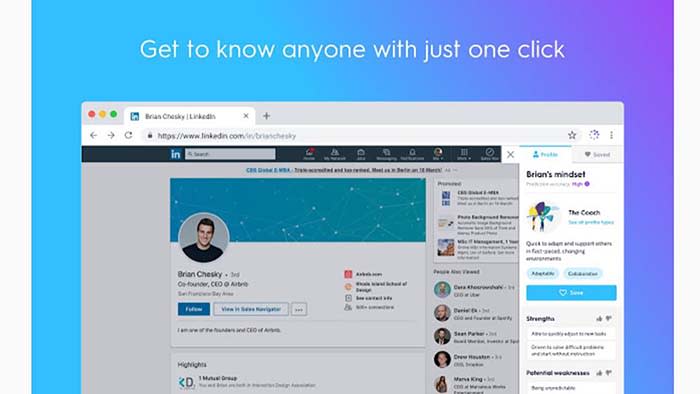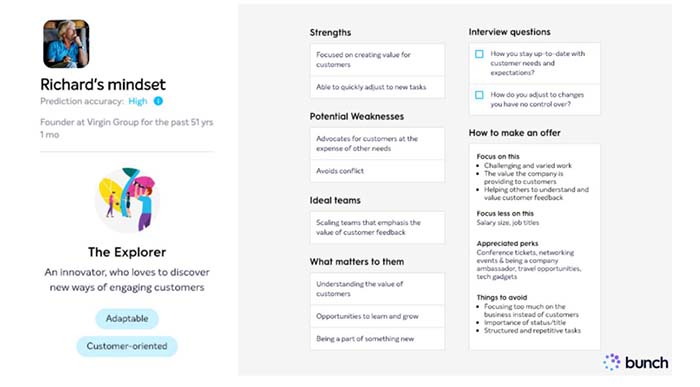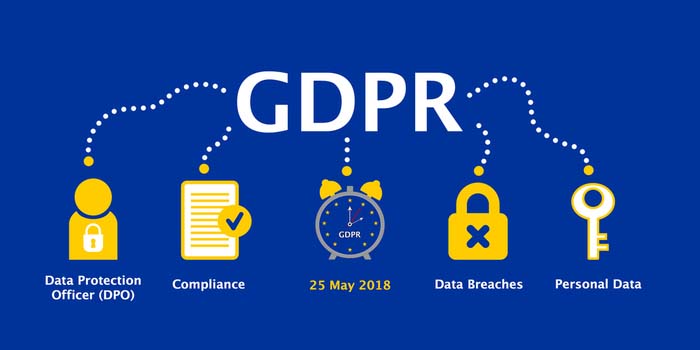Another day, another algorithm that aims to “make hiring bias disappear,” by way of analyzing your work style.

In the past, we thought that smarts alone were the best way to predict on-the-job success. Today, there’s an understanding that success depends on a collection of things: being a team player, a leader, and someone who is flexible and creative.
Of course, we live in a time where optimization trumps everything. Brands need to bet on their best candidates and now rely on personality tests and behavioral analysis to help filter.
Enter, Emma. This is the latest offering from business intelligence firm, Bunch.ai. Emma is a Chrome extension powered by AI that analyzes LinkedIn profiles to learn more about a “person’s mindset, motivations, and work style.”
While it sounds a bit creepy, Emma provides some different insights than your standard big five personality test. Here’s a little more info:
What is Emma?

Emma is an extension of Bunch.ai’s AI-based hiring tools. Like some of the other platforms we’ve run into, it uses machine-learning algorithms to determine whether a person is likely to succeed in a job.
According to Bunch’s “about us” page, their technology looks for cultural signals within other workplace tools like Slack and JIRA. These insights are then used to “manage culture” and identify how specific teams work.
Recruiters and employers can then look for potential hires that fit in with their organizational culture through Emma. The idea is presented almost like a match-making approach, so companies can fill their offices with “results-driven” or “detail-oriented” staff.
Instead of asking potential hires to take a screening assessment, they can look at their LinkedIn profile, activate Emma, and identify a person’s strengths.
While the goal is to eliminate bias, we’re not so sure. Scanning for cultural words could lead to subtle forms of discrimination that leave out qualified candidates.

The robot hiring manager — impartial recruiter or totally biased bot?
READ NOW ►Anyone can use Emma to analyze LinkedIn profiles
What makes Emma unique is that you can use “her” insights as a recruiter, an employer, or as a way to gather intelligence.
Emma uses your profile info to highlight strengths, weaknesses, and approach to work. She also sorts you into categories like “coach” or “sage.”
Or, you might be like Richard Branson, an “explorer,” who’s adaptable and customer-oriented.

Overall, the breakdown is pretty appealing. Users can quickly identify personality traits by way of a sorting hat element. You can ask “am I a sage like Bill Gates or an explorer like Richard Branson?”

How to uncover your hidden talents
Read Now ►Does Emma violate GDPR?

In case you’ve been living under a rock for the past couple of years, the GDPR is a regulatory measure passed last year in the EU designed to protect customers’ digital privacy.
Basically, GDPR dictates that any website that serves EU residents needs to obtain consent to add a user to their subscription list. It also must have a clear privacy policy that lets users know how their data will be used.
Sure while the extension doesn’t violate GDPR protocol, LinkedIn might not be happy with it. Emma actually violates their terms of service, as the AI technically scrapes data from the platform without the subject’s permission.
On Emma’s side, the company says that they aren’t exposing any information that you haven’t publicly shared. Instead, this is information that you’ve voluntarily shared on LinkedIn, so technically, there’s no violation.
This use of AI feels kind of iffy to us. On the one hand, Bunch.ai isn’t wrong. Insights come from information you’ve publicly shared, so there’s no technical violation. Still, this feels like the digital equivalent to that person who loves letting people know that they’re a body language expert.

Complete guide to advancing your career
Read Now ►Hey, it beats a traditional personality test

Emma, according to the company website, isn’t out to put you in a box based on big five traits. According to this study, the only trait indicative of workplace success is conscientiousness — and that’s not necessarily true for every type of job.
For example, jobs that require out of the box thinking or creative problem-solving don’t necessarily depend on the worker’s ability to respond to every email ASAP.
We did like a few things about the tool. For one, the profiles break down user information in an appealing way. Also, insights are more about work style than highlighting the pros and cons of your Myers-Briggs personality results. And, it’s pretty cool that users can review their own data.
However, the consent issue kind of rubs us the wrong way. You might be fine publishing information about yourself. However, you might have reservations about a recruiter running your stats through an algorithm.
Users don’t need to ask for permission, either, so anyone can look up anyone else. While it could be useful, Emma is tinged with shades of that babysitter screening tool.


